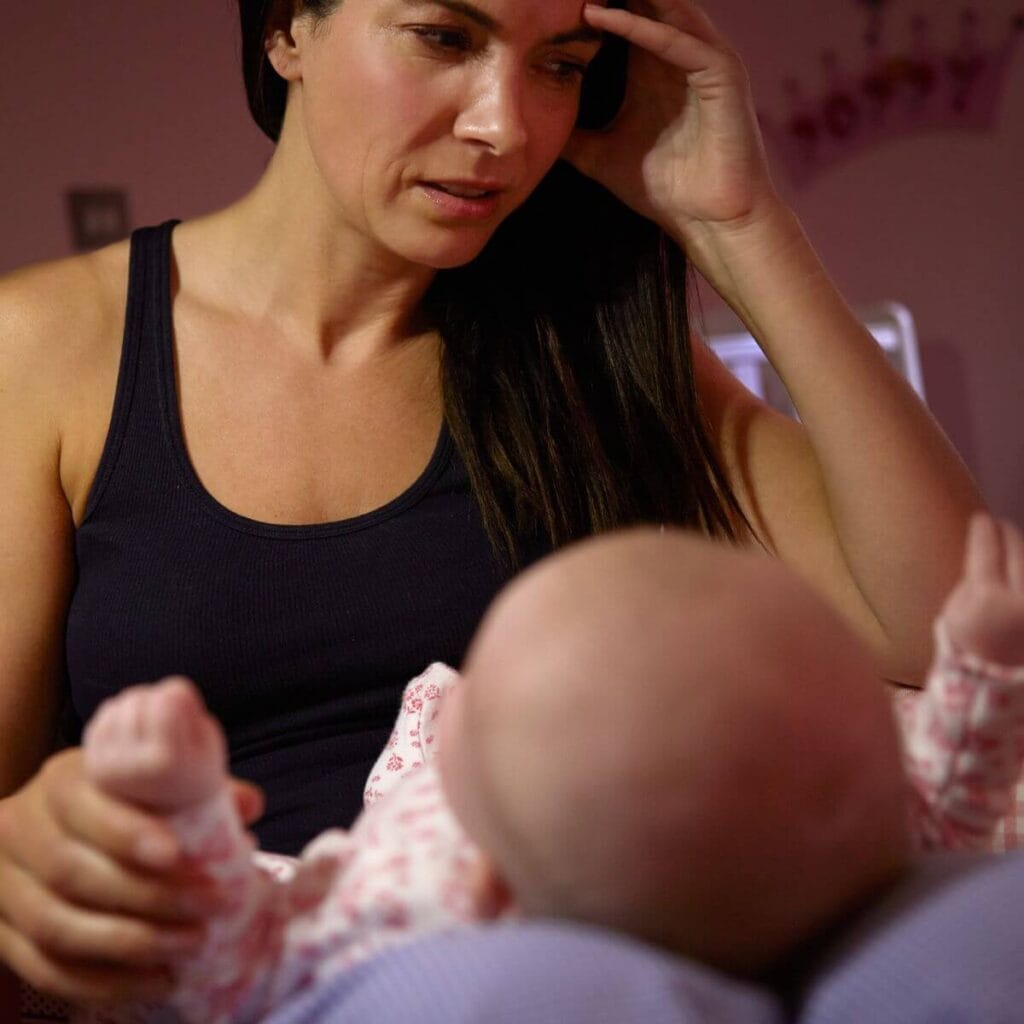In our house, the hours between 5 and 7 were a very witching time of night after our eldest was born. No, I’m not talking about demonic activity and exorcisms–I’m talking about nonstop screaming, cluster feedings, and a seemingly unappeasable newborn.
Then again, when you’re in the thick of the witching hour with your baby, it might feel like there’s some supernatural activity at play!
The witching hour is a phenomenon many new parents don’t learn about; I know we didn’t! Whether our friends were trying to protect our innocent new parent brains or had blocked out the experience, we’d never heard of it.
So, imagine our surprise when our beautiful new babe started screeching up a storm every night for hours on end.
We fed, burped, sang, walked, and rocked; no matter what type of baby-rearing basics we tried, nothing would work. Instead, she would scream so loud her face would turn red, producing a soundtrack of noise reminiscent of a horror film.
If you’re starting to feel overwhelmed by periods of non-stop crying in the evenings, you’re not alone. You can read on to learn more about a baby’s witching hour and what to do to help them.

This site contains affiliate links, meaning that we earn a small commission for purchases made through our site. We only recommend products we personally use, love, or have thoroughly vetted.
What is the Witching Hour?
Even the calmest babies on the block are bound to cry and fuss at some point. Sometimes, those periods of discontent happen during the late afternoon and evenings, every SINGLE night.
The witching hour for babies describes a pattern of fussy behavior that usually starts and ends around the same time every day. It may also be called “purple crying.”
For instance, I could practically set a clock by my daughter’s 4:30 PM cries when she was little. I could also count on those tears only lasting a couple of hours before she started to relax before bedtime.
Research suggests that, as frustrating as this stage is, witching hour is a completely normal developmental phase for babies.
Do All Babies Go Through a Witching Hour Period?
While not all babies will have a witching hour, it is common. Adjusting to the outside world is challenging for our little ones. After full days of playing, watching, developing, and learning, it’s no surprise many end up overtired and extra-stimulated.

Reasons You Might Have a “Witching Hour Baby”
So, we’ve answered the question, “what is the witching hour for babies?” by stating that it’s basically patterns of crying that last for a couple of hours in the evenings, and it starts around 2 – 3 weeks old.
But why does it happen?
Is there some transition in babies as the day moves toward midnight? Are demons and ghouls at play?
Definitely not.
While we don’t know precisely why our little ones deal with this uncomfortable time of night, there are a few theories that might explain their periods of discomfort:
1. Being Overtired
Maybe your baby skipped their second nap of the day, or perhaps they woke up earlier than usual: things like this can lead to an overtired, fussy baby. When do the crying jags usually start? You guessed it, in the evenings.
While your little one might not be ready to settle down for the evening, their overtiredness might make them cranky.
2. Cluster Feeding
Whether they’re nursing for comfort or going through a growth spurt, cluster feeding is common in breastfeeding babies.
On average, most newborns breastfeed about eight times a day (every 2 – 3 hours.) However, they may act hungry more frequently when they’re cluster feeding.
My daughter, for example, would give off hunger cues every half hour during our cluster feeding peaks.
After chatting with our pediatrician, he explained that cluster feeding is normal and usually comes in phases.
3. Overstimulation
As newborns come into the world and are trying to figure out the whole “becoming human beings” thing, they’ll face a world of new sights, sounds, and experiences.
All of that “newness” can be a bit much for them.
When overstimulation occurs in babies, it can lead to crankiness and excessive crying.
4. Tummy Troubles
As adults, we understand how miserable stomach trouble can be. However, when little ones are experiencing gastrointestinal issues, they usually deal with it by fussing. From acid reflux to lactose intolerance in breastfed babies, tummy troubles can make your newborn miserable.
In addition to increased crying, some other signs of reflux and other stomach issues include:
- Not wanting to eat or drink
- Pulling legs up
- Squirminess
- Spitting up
- Pained facial expressions
When Do Babies Outgrow Their Witching Hour?
There’s no denying the witching hour can be miserable for parents and babies alike. Thankfully, it won’t last forever. You can expect your baby’s witching hour to peak around six to eight weeks old. After that, many infants start outgrowing these fussy evening periods around 3-4 months.
Tips & Tricks for Calming the Fussiness
It’s only natural to start racking your brain for ways to help soothe your cranky little one when they’re in the middle of a witching hour experience…but HOW are you supposed to do it?
When they seem inconsolable, it might feel like there’s no way to help calm them down.
All hope is not lost, though. You can try a few tips and tricks to help curb their crankiness during the late afternoons and early evenings.
1. White Noise
Do you know the strange static sound that certain radio stations and tv channels produce? Well, it’s called white noise, and most babies love it!
The appeal is that white noise mimics the sounds babies hear inside the womb. Therefore, it has a calming effect on many little ones. The great thing about this trick for calming babies is how easily accessible it is.
Sure, you can buy a white noise machine or download an app, but there are also household items that provide the same effect. Our daughter, for instance, loved it when I would babywear her and vacuum. It offered the closeness she craved and soothing static sounds that helped her relax.
You can also use your dryer, sink, stove fan, or shower to produce similar noises.
2. Watch What You Eat
If you’re a breastfeeding mama, it’s important to remember your baby is getting traces of whatever you eat.
While that’s not usually a significant issue, some things can irritate their tiny systems and lead to more stomach problems, including
- Caffeine
- Spicy Foods
- Lots of Dairy
- Alcohol
- Citrus
Check with your lactation consultant if you’re concerned that your diet is affecting your breastfed baby.
3. Change of Scenery
When you’re sitting inside bouncing, rocking, and shushing, but nothing seems to be working, it might be time to change your scenery. We used to take our daughters for walks or sit outside on a blanket during their fussy hours.
4. Swaddling
Research shows that swaddling is highly beneficial for comforting babies. When used alongside movement and sounds (like white noise), it’s even more effective.
5. Bath Time
Not every baby enjoys bath time; many even seem to hate it. If, however, your baby likes the comfort of some nice warm water, this can be a helpful way to help them relax during their witching hour.
Make sure to create a calming environment for bath time, though. Turn down the lights if you can, play relaxing music or white noise, and speak to your baby in comforting tones. You can even include lavender-scented baby wash for its relaxation benefits.
6. Get Moving
Sitting on the couch snuggling our fussy newborn might sound like a good option, but some babies need more mobility when they’re cranky. Whether you put them in their stroller or place them in a baby wrap, movement can help them relax. A baby wrap can be the best option since it combines movement, swaddle-like constriction, and (almost) skin-to-skin contact with you.

Witching Hour vs. Colic – Are They the Same?
I often hear mamas talking about how the witching hour for babies and colic are one and the same, but is that true?
Not exactly.
While colic can undoubtedly contribute to a baby’s witching hour, the two are different.
Mayo Clinic defines colic as “frequent, prolonged and intense crying or fussiness in a healthy infant.” This might sound similar to the witching hour, but the difference is that babies experiencing colic will cry for a minimum of three hours a day, at least three days a week.
Colic crying is usually more intense than normal fussiness. Babies often act as if they’re in pain when dealing with colic.
The good news is colic will also subside with time. In fact, it usually diminishes around the same 3-4 month mark as witching hours.
If you’re concerned about your child’s crying and feel like they’re in pain, please don’t hesitate to contact your doctor. Healthcare professionals can help you determine whether there’s an underlying issue, such as a dairy allergy, to blame.
Remember to Take Care of Yourself, Too!
As parents, our gut instinct is usually to put our babies first and tend to their wants and needs above all else. While there’s nothing wrong with caring for our children (obviously!), that doesn’t mean we should push ourselves to the wayside.
Your baby’s witching hour isn’t just unpleasant for them. It might even be more stressful for us sometimes because we can’t figure out how to help them. Plus, nonstop crying can undoubtedly add to our parenting stress levels and induce anxiety in motherhood.
Make sure you’re practicing self-care and stress management during those early months of new parenthood. After all, you’ll be unable to help your baby if you can’t help yourself.
What are some of your survival methods for the witching hour? Tell us in the comments!










